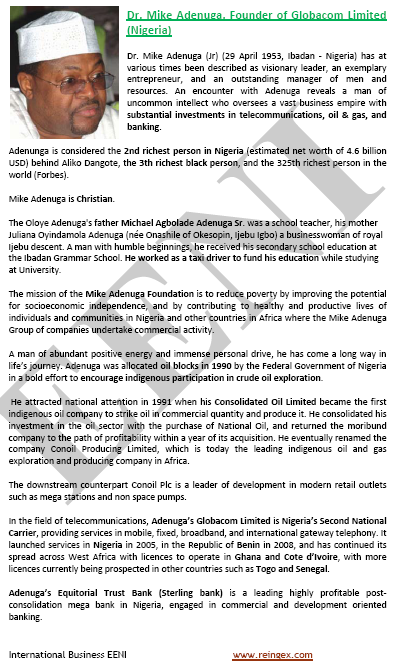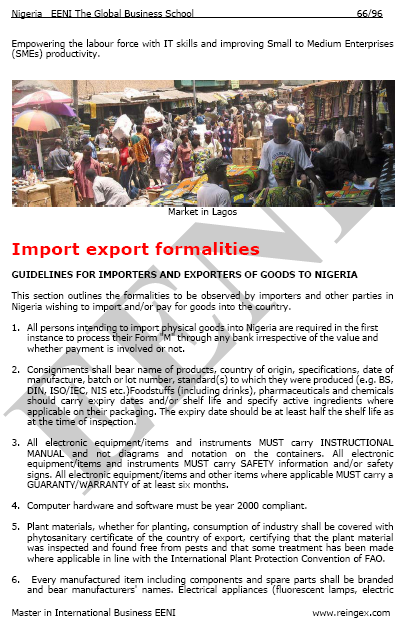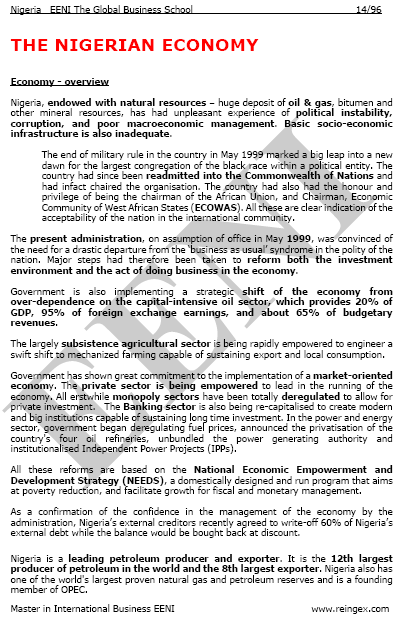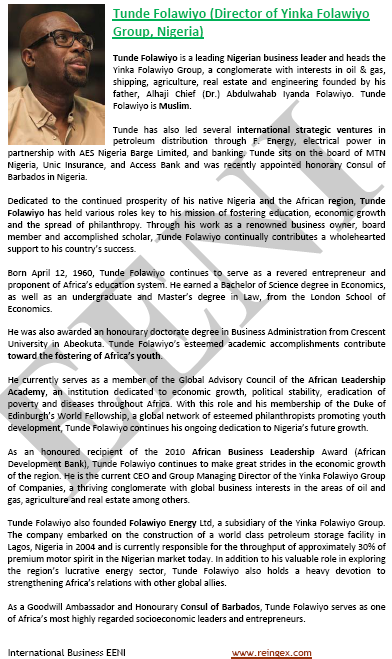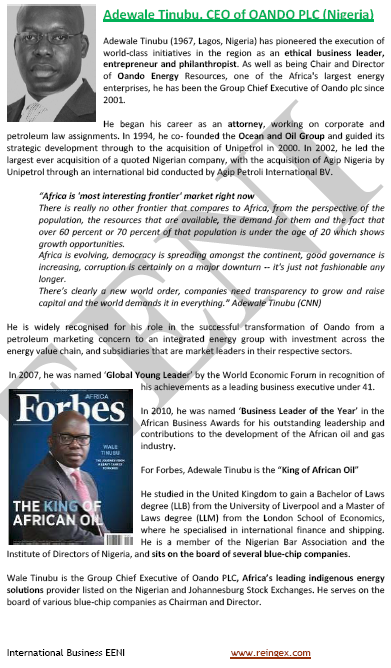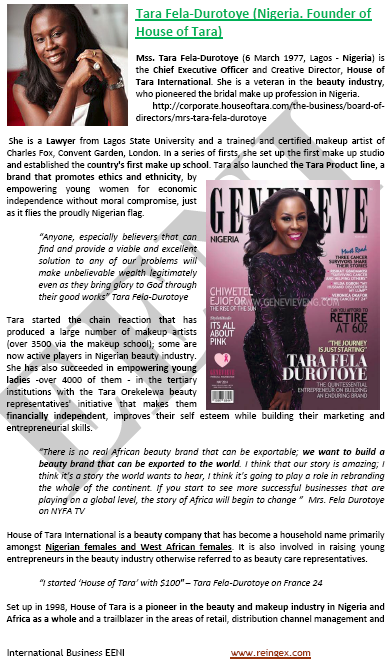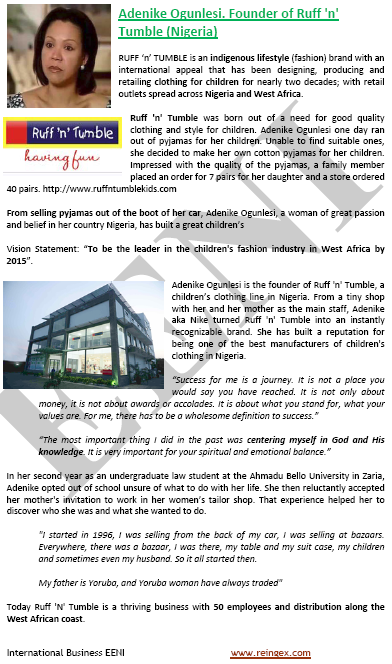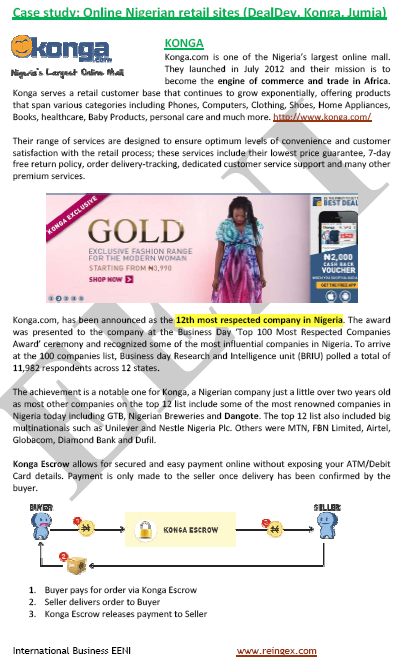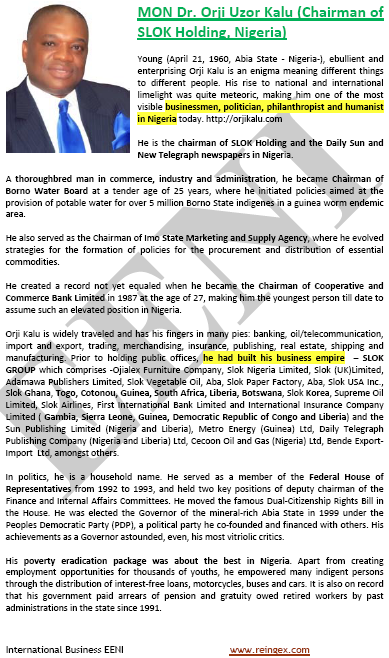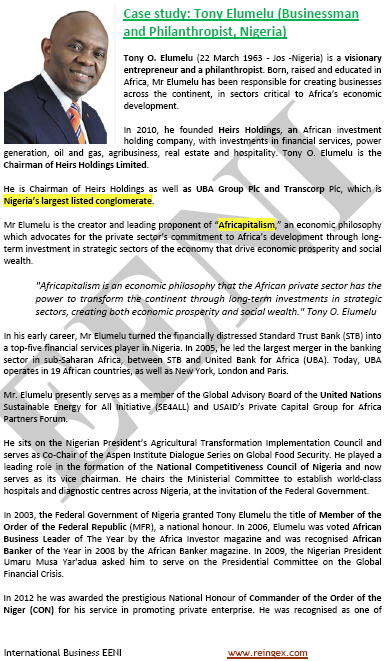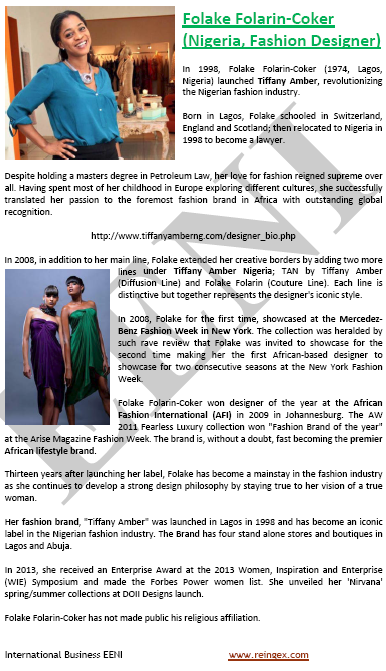Business in Nigeria

Foreign Trade and Business in Nigeria, Lagos. Nigerian Economy, Oil
- Introduction to the Federal Republic of Nigeria (West Africa)
- Nigerian Economy
- Main sectors of the Nigerian Economy:
- Petrol and gas
- Minerals
- Nigerian Agriculture
- Information and telecommunications
- Tourism
- Manufacturing
- Infrastructures
- International Trade of Nigeria
- Import/Export formalities
- Export processing (Free trade zones)
- Investment in Nigeria
- Case Study
- Transnational corporation
- Nigerian breweries
- Churchgate Group
- Starcomms
- Online Nigerian retail sites
- Access to the Nigerian Market
- Business Plan for Nigeria
Nigerian Businessman:
- Alhaji Aliko Dangote
- Jim Ovia
- Folorunsho Alakija
- Alhaji Indimi
- Hajia Bola Shagaya
- Tara Fela-Durotoye
- Adenike Ogunlesi
- Folake Folarin-Coker
- Amina Odidi
- Mike Adenuga
- Tony Elumelu
- Olufemi Otedola
- Orji Uzor Kalu
- Theophilus Danjuma
- Adewale Tinubu
- Tunde Folawiyo
- Abdulsamad Rabiu
Nigerian personalities:
The objectives of the subject “International Trade and Business in the Federal Republic of Nigeria” are the following:
- To analyze the Nigerian Economy and Global Trade
- To know the business opportunities in Nigeria
- To explore the Nigerian trade relations with the country of the student
- To know the Nigerian Trade Agreements
- To examine the profile of the Nigerian Businessman
- To develop a business plan for the Nigerian Market
Global Trade and Business in Nigeria: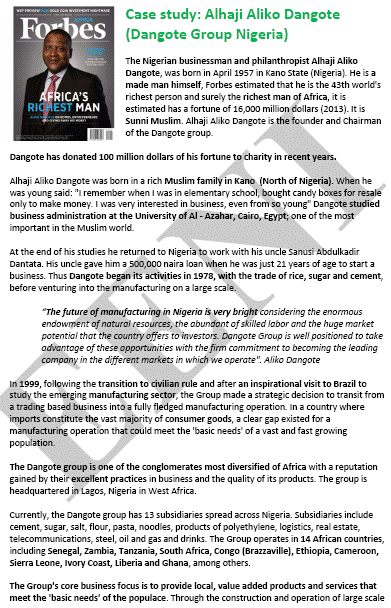

The Subject “Foreign Trade and Business in Nigeria” belongs to the following Online Programs taught by EENI Global Business School:
Doctorate: African Business, Islamic Business, World Trade.
Masters: Business in Africa, International Business, Foreign Trade.
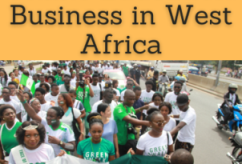
Languages:  or
or  Nigeria
Nigeria  Nigeria
Nigeria  Nigeria.
Nigeria.
- Credits of the subject “Doing Business in Nigeria”: 3

- Duration: three weeks
Area of Knowledge: Africa.

 Masters adapted to Nigerian Students.
Masters adapted to Nigerian Students.
International Trade and Business in Nigeria.
Nigeria: The largest African Economy. The first frontier market in the World



Nigerian Preferential Access and Trade Agreements:
- Nigeria and the West African Economic Area
- Economic Community of West African States (ECOWAS)
- West African Monetary Zone (WAMZ)
- Community of Sahel-Saharan States (CEN-SAD)
- African Continental Free-Trade Area
- Nigeria is a beneficiary of the Africa Growth and Opportunity Act
- Africa-EU Partnership
- Islamic Trade Preferential System
- Islamic Centre for Development of Trade
- Trade Agreement with Bharat (India)
- Niger Basin Authority
- Global System of Trade Preferences among Developing Countries (GSTP)
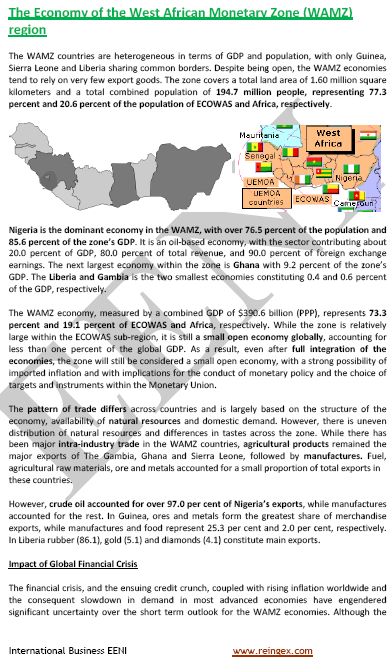

- WTO
- GATS
- Agreement on Sanitary Measures
- Agreement on Technical Barriers to Trade
- Agreement on Preshipment Inspection
- Agreement on Safeguards
- Trade Facilitation Agreement
- WCO
- Hamburg Rules (Sea)
- Rotterdam Rules
- ECOWAS Regional Road Transport and Transit Facilitation Programme
- BIC
- Chicago Convention (ICAO)
- IMO
- Convention for Safe Containers
- Istanbul Convention
- Customs Convention on Containers - not a member
- Single African Air Transport Market (SAATM / IATA)
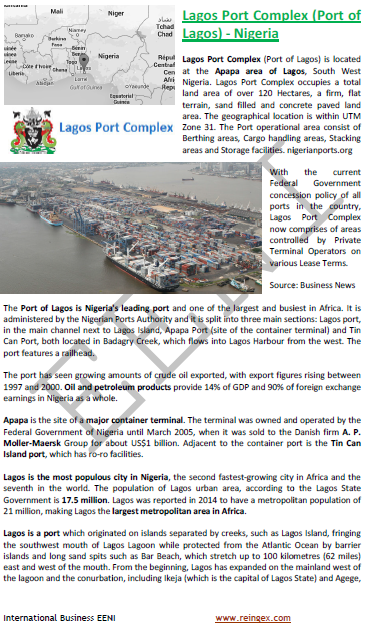

- Economic Commission for Africa
- African Union
- AU Convention on Combating Corruption
- AUDA-NEPAD
- Africa Agriculture Development Programme
- African Development Bank
- Africa-Turkey Partnership
- Africa-Korea Partnership
- Africa-Japan Cooperation
- Africa-South America Summit
- China-Africa Cooperation
- Africa-Asia Partnership
- Africa-India Cooperation
- Africa-BRICS

- Afro-Arab Cooperation
- Arab Bank for Africa (BADEA)
- Islamic Development Bank
- OIC
- Committee for Economic Cooperation
- Islamic Chamber of Commerce
- Islamic Centre for Development of Trade
- Statistical Economic Centre for Islamic Countries

- Commonwealth
- UN
- UNCTAD
- ITC
- UNCITRAL
- WIPO
- WB
- WTO
- IMF
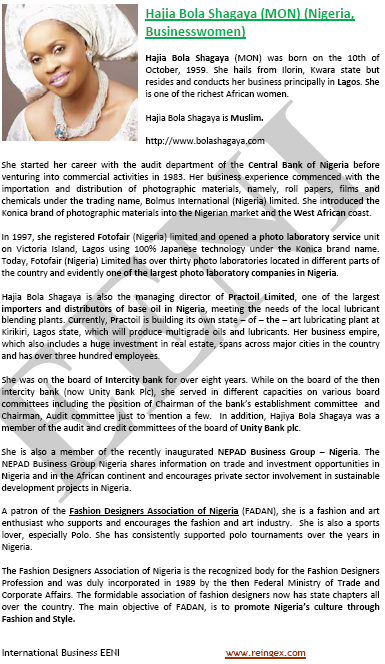
In 2050, 20% of the African children's under eighteen will live in Nigeria. Nigerian population in 2100: 1,000 million people.
The Federal Republic of Nigeria is the most populous African Country (eleventh in the World), with a population of 190 million inhabitants (annual growth: 2.3%).
- 40% of the population are Hausa, Ibo, and Yoruba, the three major ethnic groups in Nigeria
- Borders of the Federal Republic of Nigeria: Benin, Chad, Cameroon, and Niger
- The capital of Nigeria is Abuja
- The largest Nigerian city is Lagos
- The largest Nigerian cities are Port Harcourt, Kano, Ibadan, Kaduna and Maiduguri
- The total Nigerian area: 923,768 km²
- Independence of Nigeria: October 1960 from the UK
- The currency of Nigeria is the Naira
- English is the Nigerian official language
- The main Nigerian languages are HaU.S., Yoruba and Igbo (Ibo), and Fulani
More information about Nigeria (EENI African Business Portal).
Religions in Nigeria:
- Islam (50% of the Nigerian population, 64 million)
- Christianity:
- Catholicism (3 million)
- Protestants (34 million, 26% of the Nigerian population)
- Methodists: 3 million
- Baptists: 2.5 million
- African Traditional Religions


Approximately between 64 and 88 million of Nigerians are Sunni Muslims, representing roughly the half of the Nigerian population. The most followed school of law is Maliki, about 12% of Muslims are Shiites. The rest of the population is Christian and/or followers of the African Traditional Religions. As a general rule; we could say that the northern Nigeria tends to be Muslim, while the south is Christian.
In Nigeria, the Sharia has been established as the main body of civil and criminal law in nine Nigerian states with a Muslim-majority.
Nigeria belongs to the West African Economic Area.
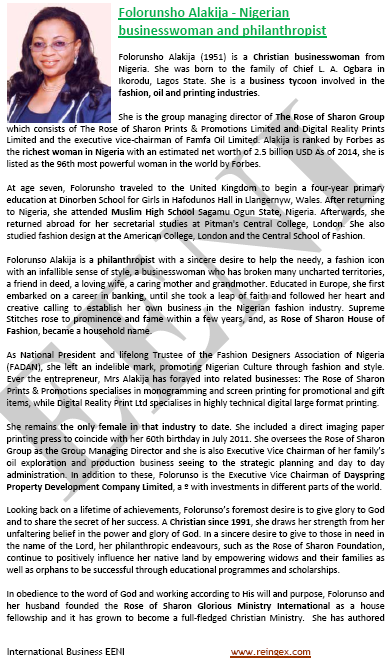

Nigerian Economy
- Nigeria is the largest African Economy (GDP: 522 billion dollars), followed by South Africa
- Nigeria is the first frontier market in the World
- Nigeria is the dominant economy in West Africa, with more than 76.5 percent of the population and 85.6 percent of the GDP of the region
- The Federal Republic of Nigeria is a petroleum-based Economy, a sector that contributes to 20 percent of the GDP, 80 percent of the total revenues and 90 percent of the foreign exchange earnings
- Petroleum revenues constitute 60% of the GDP and 90% of the Nigerian exports
- The Federal Republic of Nigeria is rich in natural resources (huge petrol and gas deposits, bitumen)
- Nigeria has had the unpleasant experience of political unsteadiness, corruption, and poor Macroeconomics management
- Basic socio-economic infrastructure is also unsuitable
- Nigeria is a leading petroleum manufacturer and exporter
- Nigeria is the thirteenth largest petroleum producer in the World and the eighth largest petroleum exporter
- Nigeria has one of the largest proven natural gas and petroleum reserves in the World
- The Nigerian Government is implementing a strategic shift of the economy from the excessive dependence on capital-intensive Oil sector (20% of the GDP, 95% of the foreign exchange earnings and 65% of the Nigerian budget)
- Nigeria has a vast local market
- Nigeria is the most populous nation in Africa. Nigeria is the tenth largest country in the world by population
- Significant changes are taken to reform the Foreign direct investment environment and business facilitation in the Federal Republic of Nigeria
- Nigeria has strong informal trade with Benin through the Port of Cotonou
- Nigeria is vital for the EU. The Nigerian exports to the EU are mainly agricultural products and petroleum
However, do business in Nigeria is complex, and it is necessary to know how to negotiate in this country. Furthermore, the famous fraud “419,” now called Advance Fee Fraud has made the image of Nigeria abroad very negative.
The Federal Republic of Nigeria has preferential market access to several Sub-Saharan Africa regional trade blocs.
